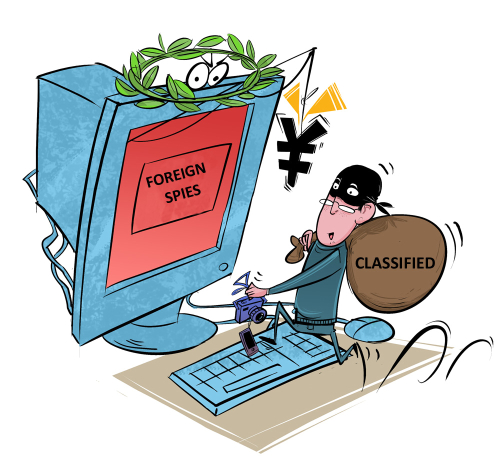|
 |
|
(CFP) |
On April 20, a resident surnamed Cao of Qingdao, east China's Shandong Province, was arrested for espionage, and his cameras, telescope and computer were taken from his home.
China Central Television reported that Cao, an employee in a state-owned company, was found to have taken pictures of an aircraft carrier base from a hill nearby and sent the photos to an "editor" who was actually a foreign spy.
Cao came into touch with the editor through the Internet. In his spare time, he often searched online for opportunities to make extra money, and he posted his personal information on several job sites. In late 2013, a man called him, saying that he was an editor for a military magazine and would like to offer him a job, which is to take pictures of military bases. Tempted by high pay, Cao purchased powerful telescope and special lenses and took pictures as directed and in return got generous pay until he was caught.
In May 2014, People's Daily reported that a resident of southwest China's Sichuan Province was sentenced to 10-year prison term for providing military secrets to a foreign intelligence agent. It was reported that in the past seven years, the agent had recruited about 40 people in more than 20 cities and regions, mainly through the Internet.
In the same month, Gao Yu, a 70-year-old Beijing resident and former journalist, was detained by Beijing police for leaking state secrets to foreign contacts. The police said that she was suspected of illegally obtaining a highly confidential document and sending it to an overseas website in June 2013, which later became widely circulated on websites.
In August 2014, a Canadian couple was detained on suspicion of stealing military secrets and intelligence information and threatening national security. They ran a coffee shop on the border between China and North Korea.
In recent years, espionage activities have increased. With the development of high-tech, hostile forces tend to use highly intelligent spying techniques, which are difficult to detect and deal with, said Liu Zhenlai, another member of the NPC Standing Committee.
"Now hostile forces tend to recruit spies and collect intelligent information through the Internet," he said.
Several years ago, a researcher in a military research institute engaging in submarine design was reported to have leaked classified information stored on his computer.
Beijing-based Global Times reported that before one traditional Chinese festival, the researcher surnamed Peng received a greeting card sent from the Commission of Science, Technology and Industry for National Defense, a government agency supervising military research. The email was faked by a foreign intelligence agency. No sooner than he opened the email, spyware was downloaded into his computer and a large amount of confidential military research materials that Peng had stored, which are not required to be copied to personal computers, on his computer was stolen.
An official responsible for investigating the case said that any individual or organizations related to government departments, the military or key industries and projects are possible targets of hostile forces.
Even a civilian company in south China contracted by the military to repair equipment has not been spared. Although the company promised to keep materials confidential in the contract, some staff breached their contract and kept the materials about the weapons to be repaired on a computer for the sake of convenience. The computer they used then accessed the Internet with the computer, which led to leakage of classified information.
The challenges China faces in maintaining national security today are more diverse than they have ever been, as it has seen complicated internal and external situations, Chinese President Xi Jinping said at the first meeting of the national security commission in April 2014.
In 2013, the Communist Party of China decided to set up the commission as the agency responsible for decision-making, deliberation and coordination on national security work.
At the commission's first meeting, Xi, also head of the commission, said China will build a comprehensive national security system that covers the politics, territory, military, economy, culture, society, science and technology, information, ecology, nuclear, and natural resources.
It is necessary to upgrade the National Security Law into the Counterespionage Law in order to "prepare for a comprehensive and fundamental state security law," said Sun Baoshu, deputy head of the Law Committee of the NPC Standing Committee.
Email us at: wanghairong@bjreview.com | 